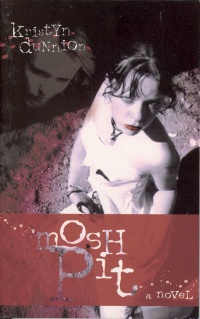| ________________
CM . . .
. Volume XI Number 12 . . . .February 18, 2005
excerpt:
Seventeen-year-old Simone brashly wears punk clothing, sports a Mohawk hairdo, and displays assorted piercings to advertise her rebelliousness. She lives with her "distracted, vulnerable" mother in the Tomb, an apartment that she calls the "postcard for pharmaceutical success." When her friend and love interest, Cherry, decides to drop out of school, the underage girls, "dolled up beyond recognition," celebrate "Cherry's Prom" night by conning their way into Satan's Playhouse where drugs and booze flow freely and Cuntagion's music "rawks." The celebration ultimately precipitates the separation between them when Cherry takes up with a dealer, Vincent, and spirals downward into addiction and crime as Simone watches, unable to save her friend. "If partying was a national sport, then Cherry is in Olympic training," Simone observes; however, initially she continues to accompany Cherry on her rampage, watching and trying to protect her, until she finally realizes that Cherry is and always has used her for her own selfish needs and desires. In a climactic scene, Simone attempts a final rescue but fails and watches Cherry crash, both literally and figuratively. Reflecting on their relationship, Simone concludes, "I had lived off the sparks that Cherry generated, lapped them up greedily, and complained only when they burnt me more than I liked or in ways I hadn't imagined. I made her my proxy and then felt betrayed when she veered off on a course that excluded me." Simone's journey of awareness takes her to clubs and bars; to after-hours parties and biker hangouts; to a job for an "internet porn site;" and to a violent attack from Officer Steve, "the hulking psychopathetic pig." She finds acceptance and friendship from a gay couple, from a burned-out guitarist, from fellow students like transsexual Carlotta and her boyfriend, and from sexy teen prostitute, Carol, with whom Simone enjoys her first real "date" and genuinely satisfying sexual experience. Simone recognizes that Carol, Carlotta and Pretty Boi all work hard and have "ideas and dreams" for after graduation, that they have learned to avoid conflict, to "fly under the radar," and not to "rattle the cages" of the "administrative wieners." With their encouragement, she resolves to attend an alternative school in the fall and "move through something new and be changed by it." Dunnion's first novel for children, Missing Matthew (2003), received accolades for its sensitive yet humourous story about friendship and loss. In Mosh Pit, Dunnion, a Toronto Tenant Advocate by day and Miss Kitty Galore, a "trash-talking high-femme" performance artist by night, again examines friendship and loss. However, this gritty narrative highlights rebellious urban youth rushing headlong into dangerous and destructive behaviours while trying to make sense of their complicated and difficult lives. In a recent interview with Samantha Sarra, Dunnion describes her novel as a "queer punk rock love tragedy" that has "the mandate of sex, drugs and rock and roll." Sex, drugs, addiction, homelessness, violence, crime, mental illness, dysfunctional families, and the like form the backdrop against which Simone's journey to self-awareness unfolds. As narrator, Simone emerges as a sympathetic central character whose vulnerability contrasts with her butch demeanor as she navigates through the rough waters of her physical and emotional choices. The lively and fast-paced prose flows smoothly and is imbued with the profanity-rich language of streetwise youth and with graphic scenes and realistic dialogue. Intertwined with the plot are 14 "Cherry's Blog" online entries recording her activities and feelings. Each blog concludes with a "Mood" note and a "Music" note that features Dunnion's music choices—the novel's soundtrack. Having only the vaguest understanding of what constituted a mosh pit, I investigated before assessing Dunnion's description and concluded that it oozes with authenticity. According to the selection quoted above and the websites I visited, a mosh pit apparently is not about violence and aggression, but about community and comradeship. Mosh Pit, as Dunnion herself candidly admits, "will never make it on the school list." However, special collections in academic and public libraries may wish to include it with their resources as a "queer punk love" story. Dunnion writes with verve and passion, and the novel will no doubt find an audience among empathetic young people. Recommended with Reservations. Darleen Golke is a "between-assignments" librarian living in Abbotsford, BC.
To comment
on this title or this review, send mail to cm@umanitoba.ca.
Copyright © the Manitoba Library Association. Reproduction for personal
use is permitted only if this copyright notice is maintained. Any
other reproduction is prohibited without permission.
NEXT REVIEW |
TABLE OF CONTENTS FOR THIS ISSUE
- February 18, 2005.
AUTHORS |
TITLES |
MEDIA REVIEWS |
PROFILES |
BACK ISSUES |
SEARCH |
CMARCHIVE |
HOME |
